


It was 1992 and the standard-one pupils of a primary school in Johore Bahru had been asked to turn up early at 7am as the school would be holding a special session to welcome the first day of school. It was a memorable day for me. Any chance to don a uniform and carry a bag filled with new books was always a cause for excitement. I was dropped off at school in a carefully put together white shirt navy blue shorts uniform, complete with clean white sneakers and knee-high socks. For the better part of the morning, classmates sitting up straight and tall at our assigned desks – our teacher, quite rightly, had a thing for good posture – told stories about their family and backgrounds. By the time the recess bell rang, I had made friends with 27 others of diverse ethnic heritage. Our teacher helped us to settle down after recess and let us do our little impromptu activities. Some cheeky boys had sneaked toys into class for play and a few girls brought dolls for show and tell. By the end of the day, our teacher conducted a ‘what-are-my-classmates-names’ quiz before we headed home with a smile.
My experience of primary school formed the construction of my childhood. I have a nephew who turned 7 last year. Unlike mine, he did not experience the first day of school: no preppy uniform, no pompoms to greet him in the schoolyard, no singing national anthem at the start of first class, no walking together across the playing field. Covid and lockdowns had certainly devastated his first day of school. But it will not – and does not – destroy his education, and overwhelming credit goes to technology as well as innovation-driven start-ups.
Innovative start-ups leverage on technology to revolutionise the way my nephew and your children learn – remote but more personal, independent yet individualised, distance but more data-driven.
Although there was technology when I attended secondary school, technology in the classroom at the time looked a lot like technology outside of it. I recalled how my classmates and I were at computers, tooling with PowerPoint decks, browsing the web, chatting with virtual friends on the other side of the world using MSN Messenger – I bet you’ve heard this one before! Each of these has proved useful, but few of them were designed specifically for the classroom.
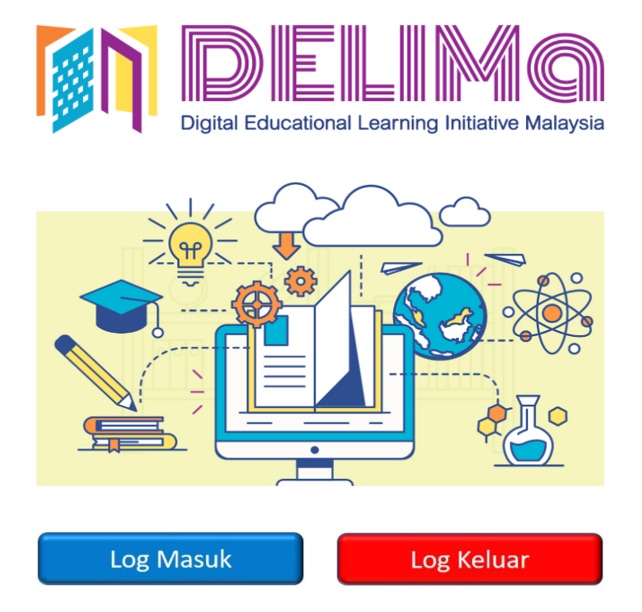
Things have changed since then. Already, there are tools that teachers can use to interact with parents in ways that would have been inconceivable twenty years ago. Covid has accelerated this transformation. Many schools now use virtual dashboards, where teachers post everything from homework assignments and test scores to video of pre-recorded lessons, and some platforms like the one by GuruLab provides livestreamed classes. Teachers these days share interactive slide decks with their students in real time, while students can pinpoint where they are having trouble so the teachers can respond immediately. More and more start-ups such as Pandai and Me Books are designing technologies to personalise the learning process and coming out with software that adapts based on how a student learns best. Teachers and parents can also get detailed reports with a wide range of metrics and most of them can be ascertained instantaneously.
Unlike my school days, these children have their own virtual tutor, and textbooks replaced by tablets that track how they learn best. As these ‘tools’ get smarter, so will their teachers who now could leverage the data, have the time one-on-one for interventions so that they could go deeper in areas of interest as well as strength. One thing that has not changed is that children don’t all learn the same way, or at the same pace – the culture of standardisation will be replaced with a culture of personalisation. That’s the future.
Ultimately, the reinvention of our Education system will require a multifaceted approach. Of course, at the crux is the material that is being learned. But it is a mistake if we focus solely on content. To truly transform the sector, we need to leverage technology and focus on great content. Start-ups are good at collaboration, and they bring integrated approaches to market – largely in partnership with others. These innovative start-ups will likely usher in the revolution in learning and pave the way for our children to grow.

Malaysia is en-route to become a high-income economy some time in the next decade, guided by the government’s economic plans under Rancangan Malaysia Ke-12 (RMK12) and Shared Prosperity Vision 2030 (SPV2030). As reported in RMK12, Malaysia’s GNI per capita in 2020 was 20.4% below the minimum high-income threshold of US$12,696. In the span between 1991 and 2020, the Malaysian economy grew by 5.2% per annum. As a result, Malaysians were able to experience a better standard of living notably based on the higher mean household income of RM7,901 in 2019 compared to RM1,169 in 1989. Absolute poverty also declined from 16.5% in 1989 based on the 1977 Poverty Line Income (PLI) methodology to 5.6% in 2019 based on the 2019 PLI methodology.
To continue the momentum from the 30-year growth and leap over the hump, Malaysia needs to invest in its most important resource – human capital – through education development.
Background On Malaysia’s Education Development
Education has always been a priority for Malaysia. As reported in The Malaysia Education Blueprint 2013-2025 (MEB), Malaysian federal government’s spending on primary and secondary education, as a percentage of GDP, was the highest in East Asia in early 1980. In 2011, the amount spent, at 3.8% of GDP or 16% of total government spending, higher than the OECD average of 3.4% of GDP and 8.7% of total public spending respectively and was also at par with or more than top-performing systems like Singapore, Japan, and South Korea. In Budget 2022, the education sector has received the highest allocation at RM67.1 billion, the largest proportion of the government’s budget for the year.
The MEB was also developed by the government to chart the progress of education for the nation. The blueprint outlines Malaysia’s ambition. While the targets set in MEB may seem ambitious, they are not a long shot.
As a result to the consistent investment in education, 32% of the labour force in Malaysia currently possess tertiary qualifications – threefold increase from 1990. Student enrolment in primary schools continued to exceed the universal enrolment threshold of over 95% since 1990. At the secondary level, the enrolment rate improved from 48% in 1990 to 92.4% in 2020.
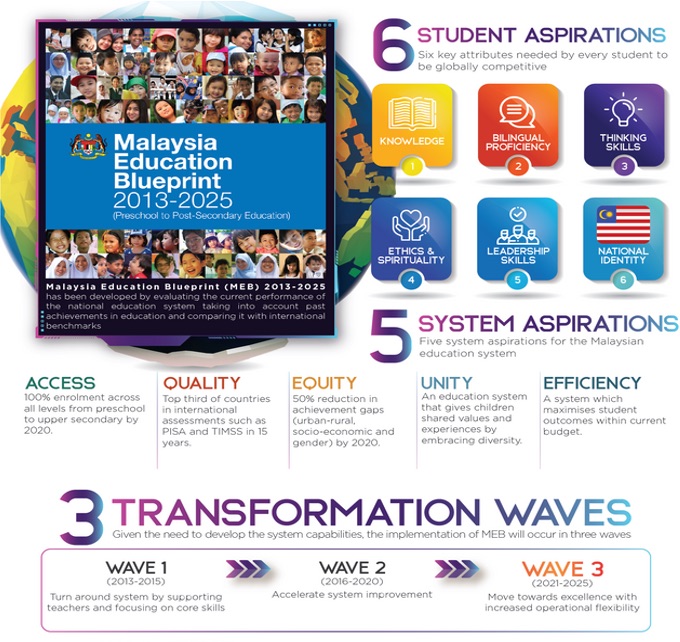
How Does Malaysian Students Stack Up Against The World?
Result from international benchmark tests such as Programme for International Student Assessment (PISA) and Trends in International Mathematics and Science Study (TIMSS) suggests that the average Malaysian students are stagnating and possibly deteriorating after 2015.
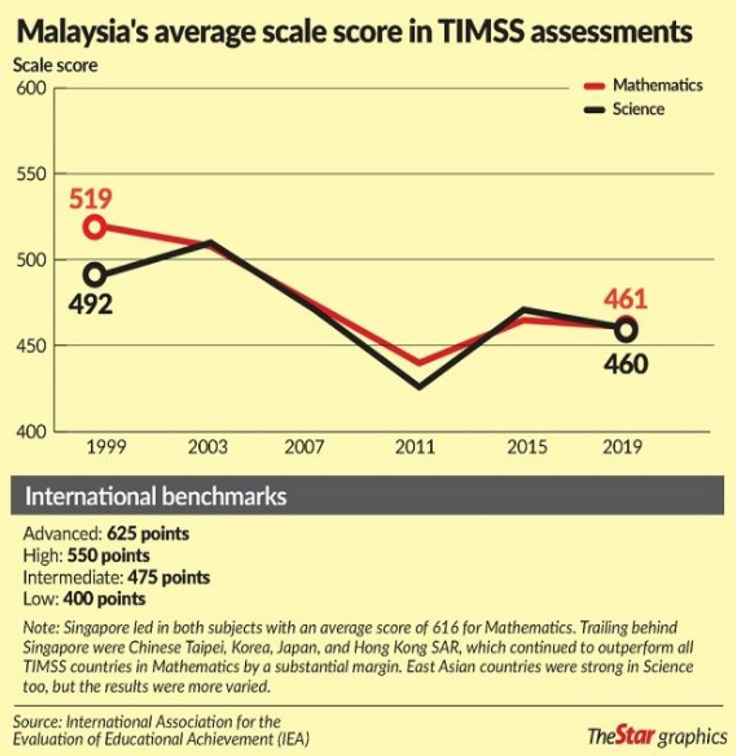
In the latest 2018 PISA ranking, Malaysia ranked 48 out of 79 countries for Mathematics, 49 for science and 57 for reading. China and Singapore scored first and second for all three categories. The PISA rankings showed that Malaysian students found analytical thinking to be challenging, and more had to be done to address it. Ministry of Education had decided to expose schoolchildren to high order thinking skills by including syllabus material that involved analytical thinking.
Therefore, Malaysia arguably still lacks behind in terms of human capital development, but the Covid pandemic has created a window of opportunity to innovate our education system.
Covid-19 Created Opportunities in Edtech
When the pandemic hit the world in 2020, many countries including Malaysia enforced lockdowns to curb the spread of the coronavirus. This left schools and higher learning institutions to move towards virtual learning overnight. Teachers had to improvise greatly and rewrite lesson plans and teaching methods. At its peak, OECD reported that more than 188 countries, encompassing around 91% of enrolled learners worldwide, closed their schools all in the fight against Covid.
Chief among key challenges brought by Covid in education is on how to adapt a system built around physical schools to a post pandemic world. Many teachers have turned to technology to deliver lessons to their students. This has brought vast opportunity for improvements in education using technology.
In fact, this has fuelled new efforts to innovate and disrupt the traditional Education system we are so familiar with, evident in the recent trends and developments in Edtech.
Case Study: US Edtech Space
The Edtech space particularly in the US has seen strong traction on the back of the Covid pandemic as students, teachers and parents adapt to new pedagogies encompassing target markets ranging from K-12 to professional certifications and doctorates. School closures arising from lockdowns, for instance, have scuttered calls for remote learning, in line with rapid digitalisation and technological penetration that has taken the world by storm!
The US arguably possesses one of the most established or developed Edtech spaces globally, and is expected to account for around half of the global demand for Edtech by 2025. It is home to some of the largest Edtech players such as Coursera and Duolingo – both of which went public in 2021 at a valuation of US$4.3 billion and US$3.7 billion, respectively. Besides, from a fundraising standpoint, US Edtech start-ups raised over US$3.2 billion in the first half of 2021, already surpassing the US$2.2 billion raised in 2020.

Note: These figures are based on public deal information for U.S. companies that primarily serve PreK-12, postsecondary and workforce education, and does not include angel investments and funding rounds currently in progress.
Upcoming Trends in K-12 Edtech
With the influx of capital flowing into the market, the K-12 Edtech space stands to benefit from this. The US K-12 Edtech space could see upcoming developments or trends that seek to leverage on technological advancements such as Augmented Reality, Virtual Reality, Big Data, and open learning. As a result, educators are now able to rely on data-driven analysis to customise the way they teach while providing regular, objective feedback and support. Students can then become more self-directed, learning at a pace that suits them, and in turn grasp the learning materials better.
The rest of the world should look towards the US as proof that innovation which lie within Edtech is boundless!
- Artificial Intelligence
Artificial Intelligence (AI) enables teachers, educators and parents alike to better understand the core competencies of children, paving the way for more customised modules that allocate more time and resources on certain topics that require further emphasis. This is made possible by the data collected from various available metrics such as the student’s time spent on each question as well as test scores. By tailoring the learning experience, AI ensures a more effective educational experience and better knowledge retention for students, while providing teachers with better insight into their students’ strengths and weaknesses.
- Augmented Reality
Augmented Reality (AR), to put it simply, improves our perception towards our surroundings by layering digital content on top of the graphic representation of the real world, effectively “augmenting” our surroundings. AR does not replace our perceived environment but integrates virtual objects into the real world. With this, the possibilities are endless.
AR allows for a more immersive and effective learning experience. For example, students during history lessons could witness with their own eyes how ancient Egyptians built the pyramids back in 2500 B.C. by just putting on a pair of AR headsets. This method of teaching will potentially develop more interest as well as understanding towards the lessons at hand.
- Asynchronous Learning
It is well-known that students tend be more immersed if they possess the freedom to learn as per their own schedules and at their own pace. After all, not every student is the same and each has their own strengths and weaknesses.
Asynchronous Learning, which encompasses various features including pre-recorded lecture videos, video demonstrations and individual projects, facilitates a learning pace that suits each student rather than forcing educators to pace the whole class at roughly the median level (which inevitably leads to some students being underwhelmed while others are overwhelmed). Edtech has allowed students’ learning experience to go beyond a typical classroom setting, where almost every aspect is standardised for all students.
Regulatory Hurdles – China Edtech Space
While the Edtech sector as a whole has seen tremendous growth on the back of the pandemic, it is difficult not to mention China’s recent crackdown on their local Edtech space.
The Chinese Edtech space was booming before the government stepped in – in 2020, China had more investment in Edtech than the last 5 years combined. Edtech start-ups saw the Covid pandemic as a huge opportunity to command a larger presence, backed by ample capital. This is further supported by various elements such as lockdown measures which enabled greater scrutiny by parents towards their children’s education. In addition, China’s abolishment of decades-old One-Child policy produced needless pressure on parents to invest into their only child’s education.
This is further exacerbated by aggressive advertising, some of it deemed misleading, by Chinese Edtech players capitalising on the situation. As a result, students and parents were under so much stress – students were burdened with excessive tuition and tutorials, while the exorbitant fees driven by corporate greed created financial discomfort for parents.
In July 2021, the Chinese government released new policies banning for-profit tutoring of core school subjects and restricting foreign investment in the sector. As a result, Edtech companies suffered heavy losses, while some had to revisit their business model or even turn non-profit. New Oriental (NYSE:EDU), one of the largest private educational services providers based in China, lost 90% of their market value and had to lay off 60,000 staff. They even incurred 20 billion yuan (£2.3 billion) for tuition refunds, employee dismissals, and classroom lease cancellations while losing 80% of their revenue.
The extent of this intervention shows the overarching impact Edtech has in our society. Education, and Edtech by extension, has the ability to shape the next generation of human population and could solve societal issues that we face such as poverty, wealth inequality and crime. Nonetheless, if things get out of hand like in China, one could ask the question on whether government regulation in other countries is looming.
What happened in China shook the Edtech space, as it created caution among investors hoping to bet on this emerging sector. With regulatory risk possibly being high as seen in China, this could impact the growth and innovation in the Edtech space.
Saving the Lost Generation
With examples in the US and China, Edtech has tremendous growth potential but it also faces the risk of regulation. Despite the high barriers to entry, we see Edtech as a focus area as it fits our Dana Penjana Nasional initiative – futureproofing Malaysian businesses and facilitating economic recovery starts from investments in human capital. Malaysia has made plans to improve the digital infrastructure via investments in 5G technology as well as formulating policies seen in the MEB. These are long term solutions to some of the problems faced by the education sector. On the more short-term solution, Edtech start-ups could address certain gaps in the system.
A case in point would be to save the “Lost Generation”. Due to the on-and-off school closures arising from the Covid pandemic, Malaysian students have experienced more than one year of immediate learning loss. These students are considered as the “Lost Generation” as they are most affected by the pandemic. We hope to bridge the learning gap and learning lost amongst Malaysian students through investments in Edtech start-ups.
Covid has created a window of opportunity to innovate our Education system. Do students need to go to schools at all? Can learning be reimagined to go beyond physical and online classrooms? How can new trends such as Augmented Reality fit in the current system and increase students’ capabilities? These are the problem statements and solutions would emerge from these Edtech start-ups – we are looking forward to back them!
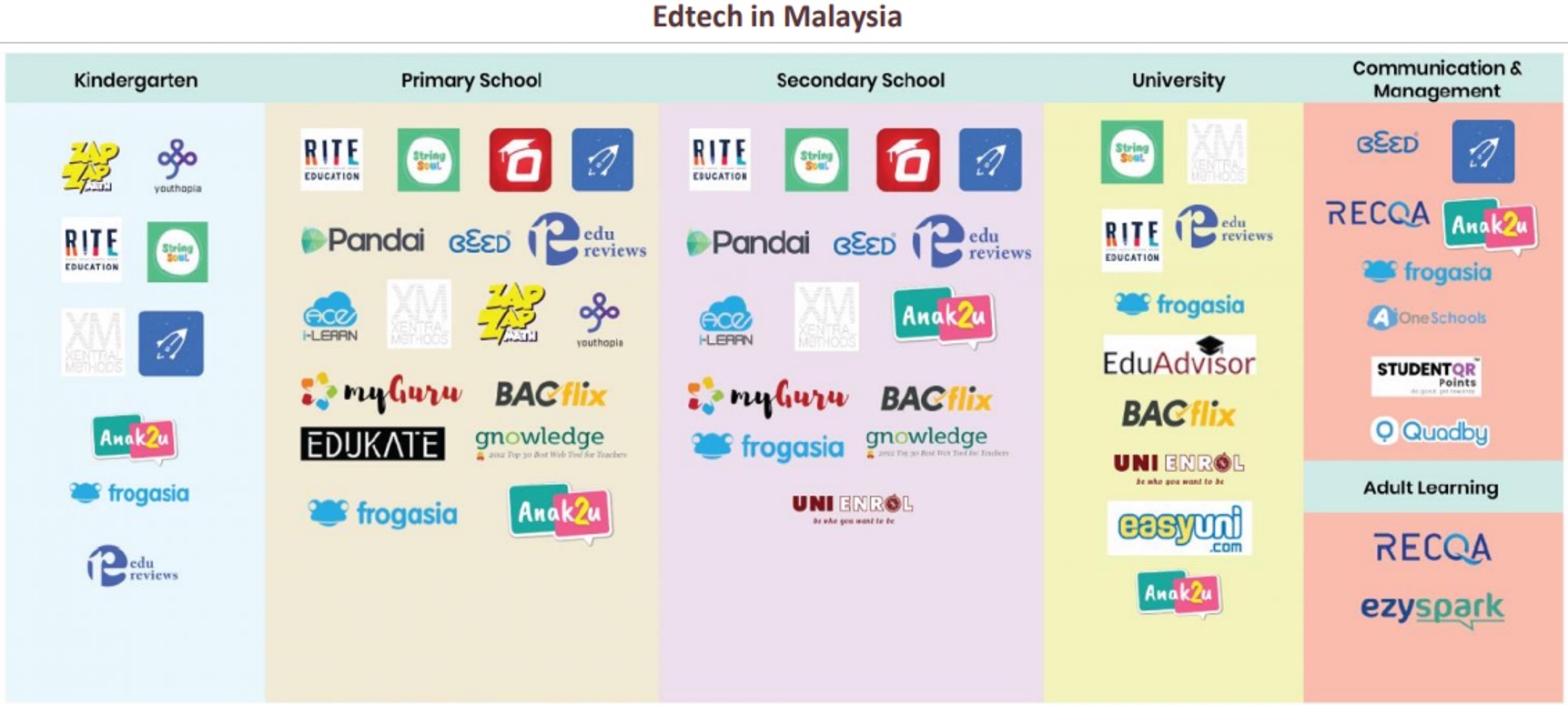

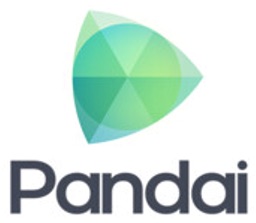
Disruptor to the Education Sector
A recent study by Edtech start-up, Pandai found that 73% of parents in Malaysia felt that learning materials provided by schools were insufficient. Parents were spending more than US$900 per year on additional classes, supplementary workbooks, and one-on-one tutoring. Materials were often found to cater to the masses and not tailored to the requirements of students. To top it all off, the price of private tutoring does not come cheap.
Aspiring to be a Malaysian “unicorn”, Pandai aims to tackle these prevailing problems in exam-driven environments in Asia Pacific and Malaysia. According to a United Nations Educational, Scientific, and Cultural Organisation (UNESCO) report, education in Southeast Asia is highly competitive and exam driven. Examinations are viewed as extremely important and is the main mechanism to access higher levels of education.
Started in 2019, Khairul Anwar (CEO), a seasoned professional in the education sector, and his team members Mohd Akmal (CTO), Mohd Suhaimi (COO) and Raja Nazatul (Head of Product) launched the Pandai app to help K-12 students learn better through interactive educational exercises. With over 14 years of local and international education experience amongst them, the founders have conducted over 800 school programmes in collaboration with the Malaysian Ministry of Education (MOE), universities, corporates, and foundations through an educational provider they previously founded called ArdentEdu.
Notably, the Kangaroo Math Competition was brought into Malaysia by Pandai’s founders and have garnered over 40,000 students – a 4x growth from when it first started in 2013. These experiences have made them well-versed in various education systems, curricula, and standards both locally and globally.
It’s no wonder that this Y-Combinator and Harvard Management Company backed start-up made great strides over the past 12 months at the peak of the pandemic and movement restrictions in the country. It grew 142% in users since December 2020, indicating a large amount of traction among the education community. In terms of monthly revenue, in December 2021 alone saw an exponential growth of 750% year-on-year.
It took advantage of this period to create unique user experiences that focused on offering customised plans with a personal touch. This resulted in the number of premium users to increase rapidly during the same period, with an annual growth rate of 360% as of December 2021. Students were able to interact with others through its student communities, compete with others through gamified quizzes and improve their academic performance through its large question bank – all in accordance with the Curriculum and Assessment Standard Document (DKSP) issued by the MOE. Students can furthermore benefit and learn from their mistakes by utilising a range of learning tools through Pandai’s solution bank and report card feature, which is only accessible through its premium subscription.
As teachers, Pandai allows them to expand their teaching mediums and have access to a larger bank of resources. Educators can create online test papers and monitor student scores to identify weaknesses while giving extra attention to those who require it. Meanwhile, parents can track their children’s academic achievements and test scores in a convenient way. Compared to its competitors in Malaysia, Pandai is more holistic in their Edtech offering in regard to its features. The application reviews are highly rated and well received by users. To accelerate its ability to offer livestreamed classes for both teachers and students, Pandai has also collaborated with India-based educational infrastructure provider Teachmint to provide live classroom solutions in Malaysia last October.
The global Edtech market was estimated at US$89.5 billion in 2020 with an expected CAGR of 19.9% until 2028. Pandai plans to capture more of this massive global pie by expanding into 5 target markets namely Indonesia, Thailand, Philippines, Pakistan, and Bangladesh. It is taking a strategic and data-driven approach to its market-entry by performing in-depth analysis on market demographics and Education system. Over the next 4 years, it is planning to launch considerably more products and new features as part of the Pandai app. This includes a LinkedIn-equivalent for student networking that can provide opportunities for better student communities.
Pandai has an opportunity to become one of Malaysia’s most valuable start-ups in the same vein as India-based Byju, an Edtech start-up currently valued at US$21 billion. Education is crucial in driving Malaysia’s vision to become a developed nation. With endless possibilities and aspirations to become a Malaysian “unicorn”, Pandai is well positioned to uplift the country’s education landscape by being the disruptive force that the sector needs to see. Not just to help it transform into a more tech-enabled space, but more importantly to make learning fun and exciting.
Pandai has successfully raised US$2 million in its Seed round from global VC investors which include Y Combinator, Global Founders Capital, 500 Global, Harvard, and Penjana Kapital through its Hibiscus Fund (managed by RHL Ventures and KB Investment). With market presence in Malaysia, expansion plan to scale regionally, and strong support from global VCs, Pandai is on track to scale and succeed.
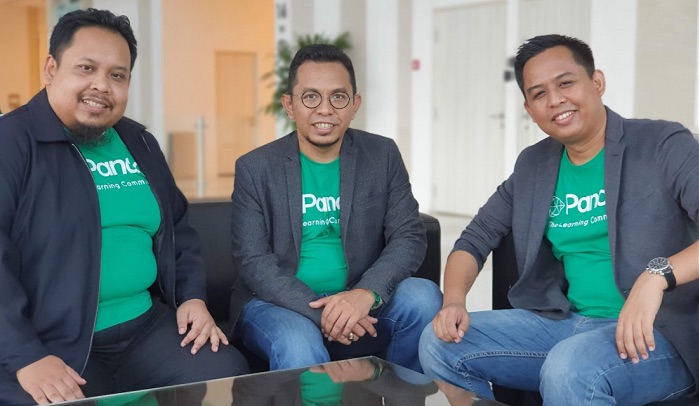
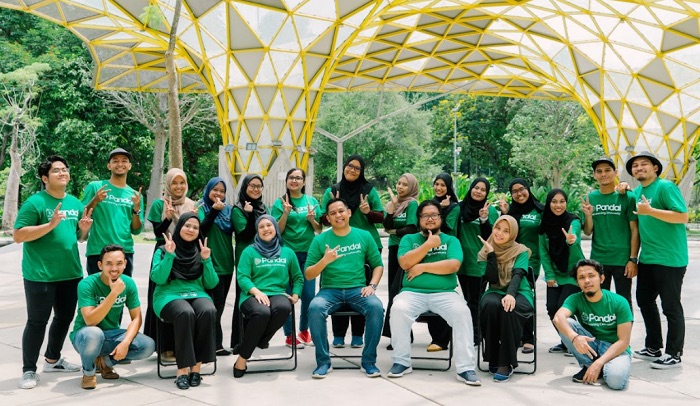

Capital Connections 3.0 – Featuring RPG Ventures
We love it and judging by the RSVP list, so do our esteemed guests. Therefore, to keep the momentum going, Capital Connections 3.0 was held on 25th of January 2022.
Another iteration of Capital Connections was held right before Chinese New Year. This time, we are featuring a start-up from a completely different sector and co-hosted by our valued VC partners, KB Investment  and RHL Ventures
and RHL Ventures  as well Hanwha Asset Management
as well Hanwha Asset Management  and Iris Capital Partners
and Iris Capital Partners 

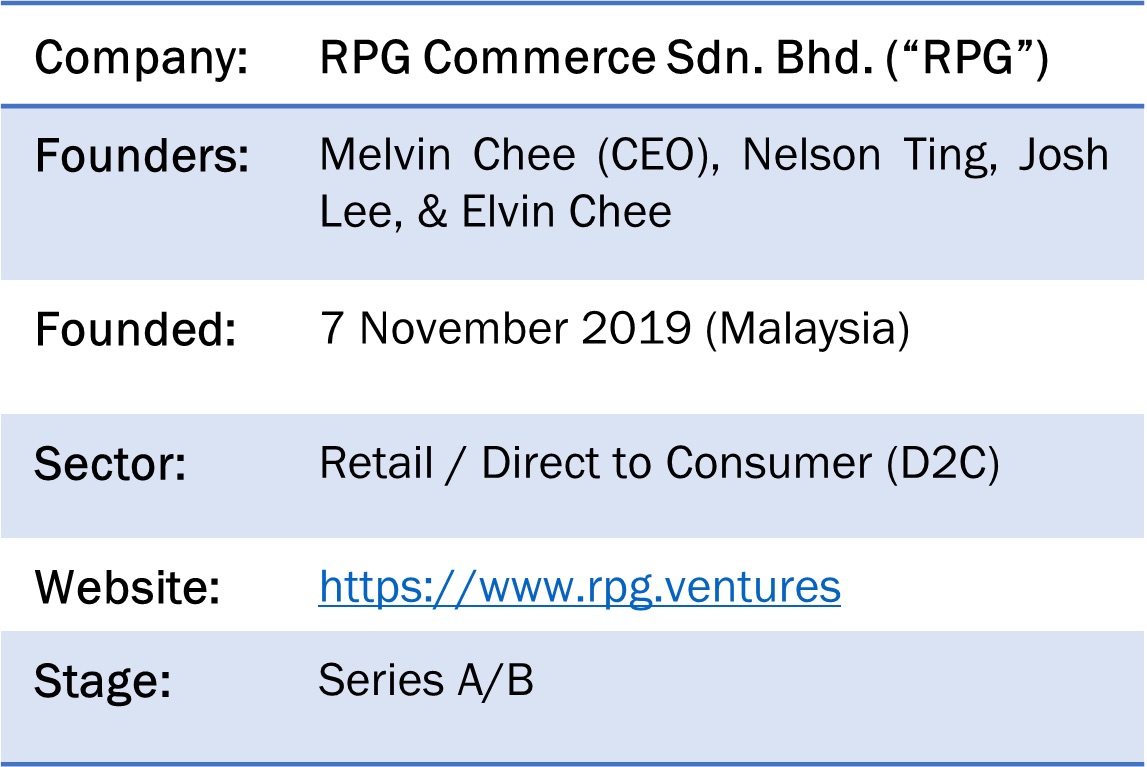
Enter RPG Ventures
Rocket Paradise Group (RPG Ventures) is a direct-to-consumer (D2C) company that specialises in building brands. Founded in 2017 in Australia, the company is currently headquartered in Malaysia with the strong belief in the D2C model and seek to create new D2C brands by disrupting the retail industry.

Since 2017, the start-up has presence in Malaysia, Singapore, Australia, US and Canada with many notable brands such as Bottoms Lab, Thousand Miles, and Comfort Republic under their belt.
Notable Brands

While some of our dear esteemed readers might not be too familiar with RPG, some of us may recognise their more notable brands such as Bottoms Lab, Thousand Miles and Comfort Republic. Each brand carries their own unique selling point.
Bottoms Lab, for instance, designed their products with great emphasis on comfort. During the launch of their flagship Momentum Pants in Malaysia, some customers had to be put on the waiting list; signaling RPG’s marketing prowess.
Meanwhile for MONTiGO, a non apparel brand, produces high quality bottles, tumblers and cups that emphasise on smart ergonomic design and high-grade heavy-duty materials.
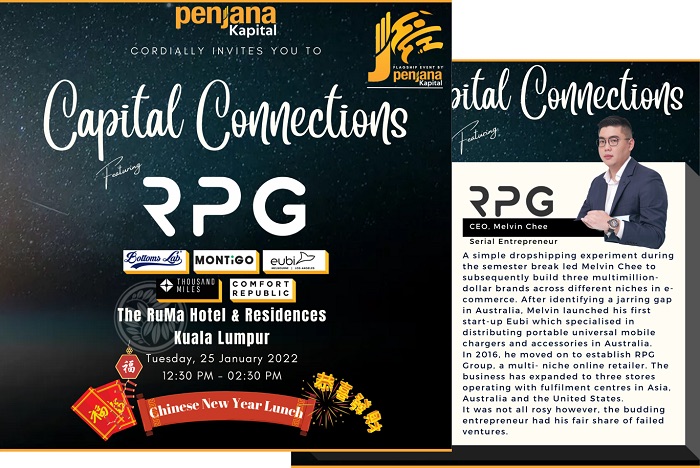
Prestige 40 under 40
For this iteration of our Capital Connections, we had the opportunity to sit down with Melvin Chee, CEO of RPG. Melvin has had 7 years of experience in eCommerce, He had generated over US$20 million during the first 3 years of his career. One of 2019 Prestige’s 40 under 40, Melvin who is an RMIT graduate, got his first business acquired when he was 18. This serial entrepreneur also has had his fair share of failed ventures which he shared during the session.
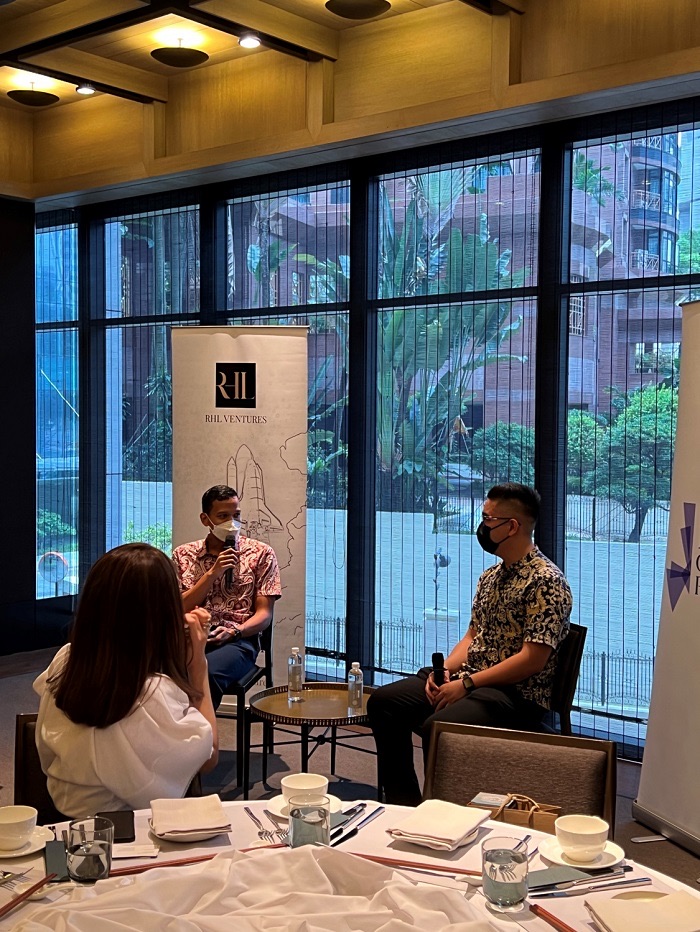
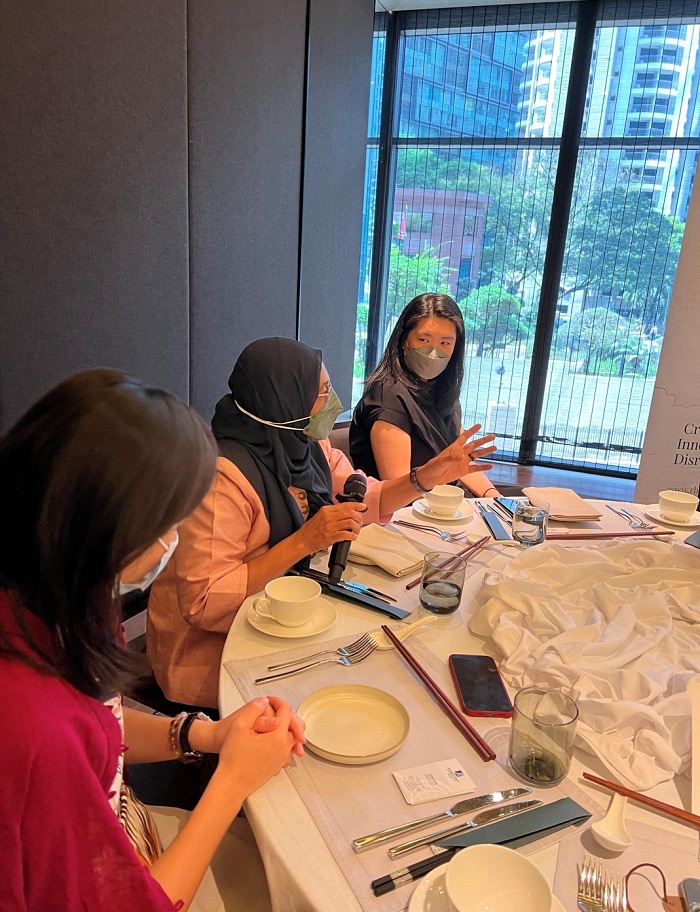
In conjunction with Lunar New Year Celebration
After a fruitful and series of Q&As, we ended our 3rd Capital Connection with yee sang, an early celebration of the upcoming Chinese New Year.
Highlights of the event can be found on our Capital Connection Showcase Page on LinkedIn including interesting bits from the Q&A session as well as candid photos of the Penjana Kapital, RHL Ventures and Iris Capital Partners team, and Melvin Chee of RPG as well.
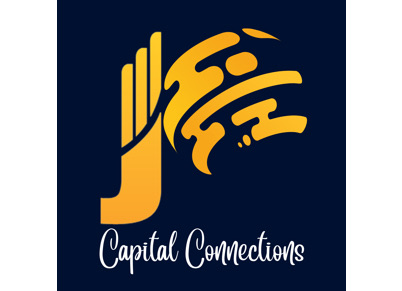
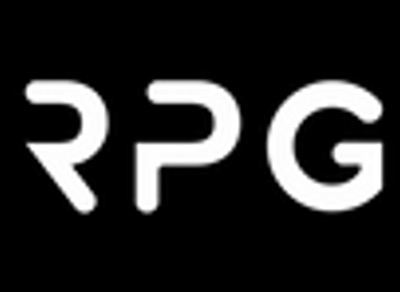
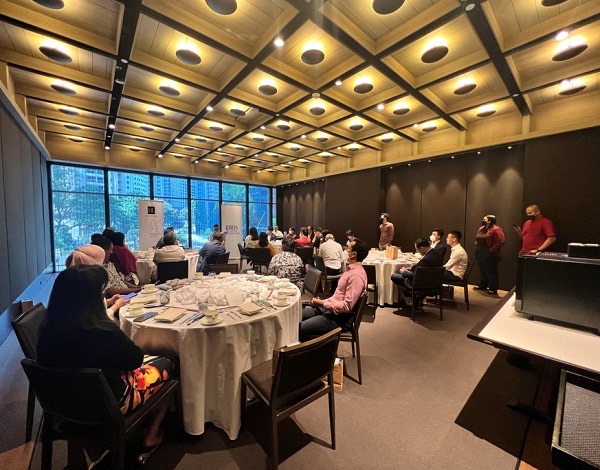
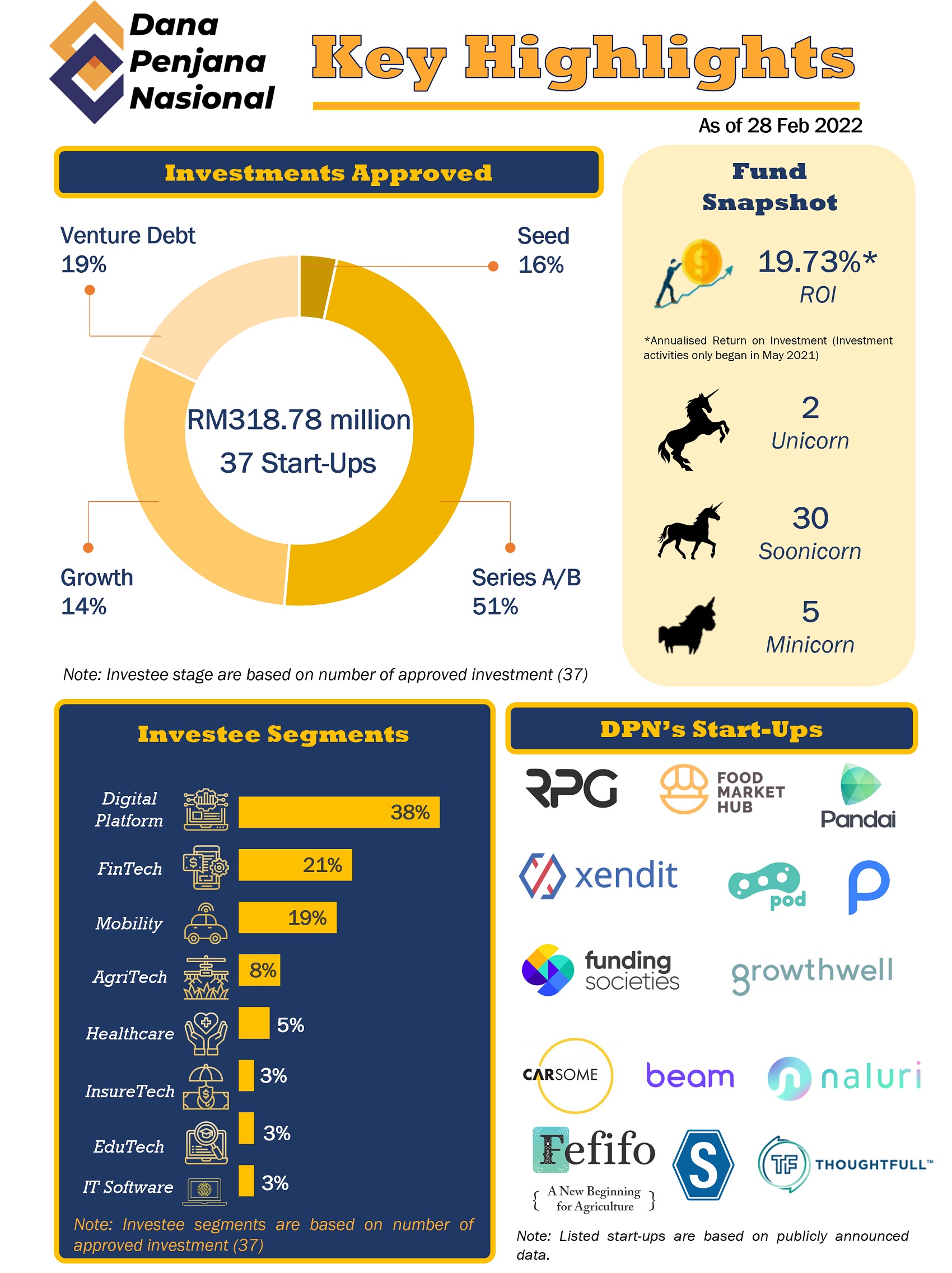
| DISCLOSURES AND DISCLAIMER |
This Newsletter is strictly informational and is issued Penjana Kapital Sdn Bhd (“PKSB”) on the basis that it is only for the information of the particular person to whom it was provided. This document may not be copied, reproduced, distributed or published by any recipient for any purpose unless Penjana Kapital Sdn Bhd’s prior written consent is obtained. This newsletter has been prepared for information purposes only and is not intended as an offer to sell or a solicitation to buy any securities, and/or any other product in Public or Private markets. Penjana Kapital Sdn Bhd is not making any recommendation to buy any securities or other product and the information provided should not be taken as investment advice.
It has been prepared without regard to the individual financial circumstances and objectives of persons who receive it. Penjana Kapital Sdn Bhd has no obligation to update its opinion or the information in this newsletter and Penjana Kapital Sdn Bhd recommends that you independently evaluate particular investments and strategies and seek the advice of a financial adviser prior to entering into any transaction. The appropriateness of a particular investment or strategy will depend on your individual circumstances and objectives. The information herein was obtained or derived from sources that Penjana Kapital Sdn Bhd believes are reliable, but while all reasonable care has been taken to ensure that stated facts are accurate and opinions fair and reasonable, we do not represent that it is accurate or complete and it should not be relied upon as such. All opinions and estimates included in this newsletter constitute our views as of this date and are subject to change without notice.
Penjana Kapital Sdn Bhd is not acting as your advisor and does not owe any fiduciary duties to you in connection with this newsletter and no reliance may be placed on Penjana Kapital Sdn Bhd for advice or recommendations of any sort. Nothing in this newsletter shall constitute legal, accounting or tax advice, or a representation that any transaction or investment is appropriate for you taking into account your investment objectives, financial situation and particular needs, or otherwise constitutes any such advice to you. Penjana Kapital Sdn Bhd makes no representations or warranties, express or implied, with respect to the accuracy of the information or fitness for any particular purpose and does not accept any liability (including but not limited to any direct, indirect or consequential losses, loss of profits and damages) for any use you or your advisors make of the contents of this newsletter or for any loss that may arise from the use of this newsletter or reliance by any person upon such information or opinions provided in the newsletter. This newsletter has been prepared by the analysts of Penjana Kapital Sdn Bhd. Facts and views presented in this newsletter may not reflect the views of or information known to other business units within Penjana Kapital Sdn Bhd. This information herein is not intended to constitute “research” as it is defined by applicable laws. This newsletter is not directed to or intended for distribution to or use by any person or entity who is a citizen or resident of or located in any locality, state, country or other jurisdiction where such distribution, publication, availability or use would be contrary to law or regulation. The information provided in this document has been obtained or derived from sources believed to be reliable. Penjana Kapital Sdn Bhd does not guarantee its accuracy or completeness and does not assume any liability for any loss that may result from the reliance by any person upon any such information or opinion. Such information or opinions are subject to change without notice, are for general information only and is not intended as an offer to sell or a recommendation/ solicitation to buy any securities, foreign exchange or other product.
